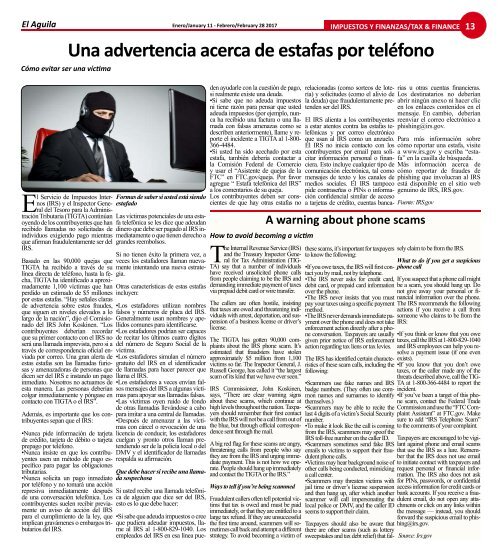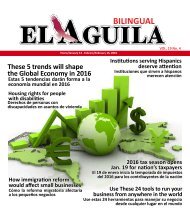El Aguila Magazine – January 11, 2017
Create successful ePaper yourself
Turn your PDF publications into a flip-book with our unique Google optimized e-Paper software.
<strong>El</strong> <strong>Aguila</strong> Enero/<strong>January</strong> <strong>11</strong> - Febrero/February 28 <strong>2017</strong><br />
IMPUESTOS Y FINANZAS/TAX & FINANCE<br />
13<br />
Cómo evitar ser una víctima<br />
<strong>El</strong> Servicio de Impuestos Internos<br />
(IRS) y el Inspector General<br />
del Tesoro para la Administración<br />
Tributaria (TIGTA) continúan<br />
oyendo de los contribuyentes que han<br />
recibido llamadas no solicitadas de<br />
individuos exigiendo pago mientras<br />
que afirman fraudulentamente ser del<br />
IRS.<br />
Basado en las 90,000 quejas que<br />
TIGTA ha recibido a través de su<br />
línea directa de teléfono, hasta la fecha,<br />
TIGTA ha identificado a aproximadamente<br />
1,100 víctimas que han<br />
perdido un estimado de $5 millones<br />
por estas estafas. “Hay señales claras<br />
de advertencia sobre estos fraudes,<br />
que siguen en niveles elevados a lo<br />
largo de la nación”, dijo el Comisionado<br />
del IRS John Koskinen. “Los<br />
contribuyentes deberían recordar<br />
que su primer contacto con el IRS no<br />
será una llamada imprevista, pero si a<br />
través de correspondencia oficial enviada<br />
por correo. Una gran alerta de<br />
estas estafas son las llamadas furiosas<br />
y amenazadoras de personas que<br />
dicen ser del IRS e instando un pago<br />
inmediato. Nosotros no actuamos de<br />
esta manera. Las personas deberían<br />
colgar inmediatamente y póngase en<br />
contacto con TIGTA o el IRS”.<br />
Además, es importante que los contribuyentes<br />
sepan que el IRS:<br />
•Nunca pide información de tarjeta<br />
de crédito, tarjeta de débito o tarjeta<br />
prepago por teléfono.<br />
•Nunca insiste en que los contribuyentes<br />
usen un método de pago específico<br />
para pagar las obligaciones<br />
tributarias.<br />
•Nunca solicita un pago inmediato<br />
por teléfono y no tomará una acción<br />
represiva inmediatamente después<br />
de una conversación telefónica. Los<br />
contribuyentes suelen recibir previamente<br />
un aviso de acción del IRS<br />
para el cumplimiento de la ley, que<br />
implican gravámenes o embargos tributarios<br />
del IRS.<br />
Una advertencia acerca de estafas por teléfono<br />
Formas de saber si usted está siendo<br />
estafado<br />
Las víctimas potenciales de una estafa<br />
telefónica se les dice que adeudan<br />
dinero que debe ser pagado al IRS inmediatamente<br />
o que tienen derecho a<br />
grandes reembolsos.<br />
Si no tienen éxito la primera vez, a<br />
veces los estafadores llaman nuevamente<br />
intentando una nueva estrategia.<br />
Otras características de estas estafas<br />
incluyen:<br />
•Los estafadores utilizan nombres<br />
falsos y números de placa del IRS.<br />
Generalmente usan nombres y apellidos<br />
comunes para identificarse.<br />
•Los estafadores podrían ser capaces<br />
de recitar los últimos cuatro dígitos<br />
del número de Seguro Social de la<br />
víctima.<br />
•Los estafadores simulan el número<br />
gratuito del IRS en el identificador<br />
de llamadas para hacer parecer que<br />
llama el IRS.<br />
•Los estafadores a veces envían falsos<br />
mensajes del IRS a algunas víctimas<br />
para apoyar sus llamadas falsas.<br />
•Las víctimas oyen ruido de fondo<br />
de otras llamadas llevándose a cabo<br />
para imitar a una central de llamadas.<br />
•Después de amenazar a las víctimas<br />
con cárcel o revocación de una<br />
licencia de conducir, los estafadores<br />
cuelgan y pronto otros llaman pretendiendo<br />
ser de la policía local o del<br />
DMV y el identificador de llamadas<br />
respalda su afirmación.<br />
Que debe hacer si recibe una llamada<br />
sospechosa<br />
Si usted recibe una llamada telefónica<br />
de alguien que dice ser del IRS,<br />
esto es lo que debe hacer:<br />
•Si sabe que adeuda impuestos o cree<br />
que pudiera adeudar impuestos, llame<br />
al IRS al 1-800-829-1040. Los<br />
empleados del IRS en esa línea pueden<br />
ayudarle con la cuestión de pago,<br />
si realmente existe una deuda.<br />
•Si sabe que no adeuda impuestos<br />
ni tiene razón para pensar que usted<br />
adeuda impuestos (por ejemplo, nunca<br />
ha recibido una factura o una llamada<br />
con falsas amenazas como se<br />
describen anteriormente), llame y reporte<br />
el incidente a TIGTA al 1-800-<br />
366-4484.<br />
•Si usted ha sido acechado por esta<br />
estafa, también debería contactar a<br />
la Comisión Federal de Comercio<br />
y usar el “Asistente de quejas de la<br />
FTC” en FTC.gov/queja. Por favor<br />
agregue “ Estafa telefónica del IRS”<br />
a los comentarios de su queja.<br />
Los contribuyentes deben ser conscientes<br />
de que hay otras estafas no<br />
How to avoid becoming a victim<br />
The Internal Revenue Service (IRS)<br />
and the Treasury Inspector General<br />
for Tax Administration (TIG-<br />
TA) say that a number of individuals<br />
have received unsolicited phone calls<br />
from people claiming to be the IRS and<br />
demanding immediate payment of taxes<br />
via prepaid debit card or wire transfer.<br />
The callers are often hostile, insisting<br />
that taxes are owed and threatening individuals<br />
with arrest, deportation, and suspension<br />
of a business license or driver’s<br />
license.<br />
The TIGTA has gotten 90,000 complaints<br />
about the IRS phone scam. It’s<br />
estimated that fraudsters have stolen<br />
approximately $5 million from 1,100<br />
victims so far. The Inspector General, J.<br />
Russell George, has called it “the largest<br />
scam of its kind that we have ever seen.”<br />
IRS Commissioner, John Koskinen,<br />
says, “There are clear warning signs<br />
about these scams, which continue at<br />
high levels throughout the nation. Taxpayers<br />
should remember their first contact<br />
with the IRS will not be a call from out of<br />
the blue, but through official correspondence<br />
sent through the mail.<br />
A big red flag for these scams are angry,<br />
threatening calls from people who say<br />
they are from the IRS and urging immediate<br />
payment. This is not how we operate.<br />
People should hang up immediately<br />
and contact the TIGTA or the IRS.”<br />
Ways to tell if you’re being scammed<br />
Fraudulent callers often tell potential victims<br />
that tax is owed and must be paid<br />
immediately, or that they are entitled to a<br />
large tax refund. If they are unsuccessful<br />
the first time around, scammers will sometimes<br />
call back and attempt a different<br />
strategy. To avoid becoming a victim of<br />
relacionadas (como sorteos de lotería)<br />
y solicitudes (como el alivio de<br />
la deuda) que fraudulentamente pretenden<br />
ser del IRS.<br />
A warning about phone scams<br />
these scams, it’s important for taxpayers<br />
to know the following:<br />
•If you owe taxes, the IRS will first contact<br />
you by mail, not by telephone.<br />
•The IRS never asks for credit card,<br />
debit card, or prepaid card information<br />
over the phone.<br />
•The IRS never insists that you must<br />
pay your taxes using a specific payment<br />
method.<br />
•The IRS never demands immediate payment<br />
over the phone and does not take<br />
enforcement action directly after a phone<br />
conversation. Taxpayers are usually<br />
given prior notice of IRS enforcement<br />
action regarding tax liens or tax levies.<br />
The IRS has identified certain characteristics<br />
of these scam calls, including the<br />
following:<br />
•Scammers use fake names and IRS<br />
badge numbers. (They often use common<br />
names and surnames to identify<br />
themselves.)<br />
•Scammers may be able to recite the<br />
last 4 digits of a victim’s Social Security<br />
number.<br />
•To make it look like the call is coming<br />
from the IRS, scammers may spoof the<br />
IRS toll-free number on the caller ID.<br />
•Scammers sometimes send fake IRS<br />
emails to victims to support their fraudulent<br />
phone calls.<br />
•Victims may hear background noise of<br />
other calls being conducted, mimicking<br />
a call center.<br />
•Scammers may threaten victims with<br />
jail time or driver’s license suspension<br />
and then hang up, after which another<br />
scammer will call impersonating the<br />
local police or DMV, and the caller ID<br />
seems to support their claim.<br />
<strong>El</strong> IRS alienta a los contribuyentes<br />
a estar atentos contra las estafas telefónicas<br />
y por correo electrónico<br />
que usan al IRS como un anzuelo.<br />
<strong>El</strong> IRS no inicia contacto con los<br />
contribuyentes por email para solicitar<br />
información personal o financiera.<br />
Esto incluye cualquier tipo de<br />
comunicación electrónica, tal como<br />
mensajes de texto y los canales de<br />
medios sociales. <strong>El</strong> IRS tampoco<br />
pide contraseñas o PINs o información<br />
confidencial similar de acceso<br />
a tarjetas de crédito, cuentas bancarias<br />
u otras cuentas financieras.<br />
Los destinatarios no deberían<br />
abrir ningún anexo ni hacer clic<br />
en los enlaces contenidos en el<br />
mensaje. En cambio, deberían<br />
reenviar el correo electrónico a<br />
phishing@irs.gov.<br />
Para más información sobre<br />
cómo reportar una estafa, visite<br />
a www.irs.gov y escriba “estafa”<br />
en la casilla de búsqueda.<br />
Más información acerca de<br />
cómo reportar de fraudes de<br />
phishing que involucran al IRS<br />
está disponible en el sitio web<br />
genuino de IRS, IRS.gov.<br />
Fuente: IRS.gov<br />
Taxpayers should also be aware that<br />
there are other scams (such as lottery<br />
sweepstakes and tax debt relief) that falsely<br />
claim to be from the IRS.<br />
What to do if you get a suspicious<br />
phone call<br />
If you suspect that a phone call might<br />
be a scam, you should hang up. Do<br />
not give away your personal or financial<br />
information over the phone.<br />
The IRS recommends the following<br />
actions if you receive a call from<br />
someone who claims to be from the<br />
IRS:<br />
•If you think or know that you owe<br />
taxes, call the IRS at 1-800-829-1040<br />
and IRS employees can help you resolve<br />
a payment issue (if one even<br />
exists).<br />
•If you know that you don’t owe<br />
taxes, or the caller made any of the<br />
threats described above, call the TIG-<br />
TA at 1-800-366-4484 to report the<br />
incident.<br />
•If you’ve been a target of this phone<br />
scam, contact the Federal Trade<br />
Commission and use the “FTC Complaint<br />
Assistant” at FTC.gov. Make<br />
sure to add “IRS Telephone Scam”<br />
to the comments of your complaint.<br />
Taxpayers are encouraged to be vigilant<br />
against phone and email scams<br />
that use the IRS as a lure. Remember<br />
that the IRS does not use email<br />
to initiate contact with taxpayers and<br />
request personal or financial information.<br />
The IRS also does not ask<br />
for PINs, passwords, or confidential<br />
access information for credit cards or<br />
bank accounts. If you receive a fraudulent<br />
email, do not open any attachments<br />
or click on any links within<br />
the message — instead, you should<br />
forward the suspicious email to phishing@irs.gov.<br />
Source: Irs.gov
















